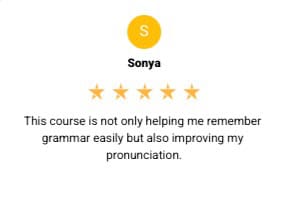Interesting ways to say LIKE and DON’T LIKE in IELTS Speaking
👇 Take this lesson with you! 👇
In this lesson, I will show you some interesting ways of expressing likes and dislikes, so you can show off a wider range of vocabulary to the examiner.
We will look at ways to say,
- You like it
- You are indifferent (neither like nor dislike)
- You don’t like it
Table of Contents
Other words for LIKE
- To be into _____
Often used for hobbies
I am into art
I am into modern art
I’m quite into art, especially modern art
- To have a thing for ____
When you like unusual and specific things
I have a thing for chocolate mints
I have a thing for 90’s music
I have a thing for Chinese comic books
This phrase can also be used for people, when you are attracted to that person.
I have a thing for this girl at work
- To have a soft spot for ____
You like something or someone, but it’s hard to explain why
I have soft spot for old movies
I have a soft spot for dogs
I have a bit of a soft spot for old movies
She has a soft spot for her niece
This father has a soft spot for his youngest daughter
- To be partial to ______
I am partial to red wine
I am partial to Spanish red wine
I’m quite partial to Spanish red wine
I’m rather partial to Spanish red wine
- To take to / To warm up to / To grow on
The following phrases are for things you didn’t like at first, but now you are starting to like it / them.
When I arrived in Spain, I didn’t like the food, but now I’m taking to it
When I arrived in Spain, I didn’t like the food, but now I have taken to it
I never used to like this job, but now I’m warming to it
I never used to like this job, but now I have warmed to it
I used to hate gardening, but nowadays it’s growing on me
I used to dislike history, but since watching that documentary it has grown on me

Other words for INDIFFERENT
Below we have some phrases to talk about both things and activities that you neither like nor dislike.
Do you like art?
I don’t mind it
It’s not bad
I can take it or leave it
I don’t dislike it
Do you like getting up early in the morning?
It’s no big deal
It doesn’t bother me
I don’t mind it
TIP 1.
If we use ‘don’t mind’ followed by a verb, the verb needs to be in the gerund.
I don’t mind + Verb (Gerund)
I don’t mind doing that
I don’t mind getting up early, so long as it’s not too early!

Other words for DISLIKE
Do you like cooking?
- I don’t care for____
I don’t care for it
I don’t care for cooking, it’s too much hard work!
I don’t care for English food
TIP 2.
If we use ‘don’t care for’ followed by a verb, the verb needs to be in the gerund.
I don’t care FOR + VERB (gerund)
I don’t care for cooking
I don’t care much for cooking
- It does nothing for me
I’m really not into history, it does nothing for me.
- I can’t be doing with it
Often connected to being impatient and not liking something.
Do you like modern art?
No, I can’t be doing with it. It makes no sense to me.
- I can’t stand it
Saying more strongly that you really don’t like something
I can’t stand waiting in line
I can’t stand maths, it’s just too complicated
I can’t stand this food, it’s horrible.
TIP 3
Notice, when speaking, we sometimes drop the subject
Do you like this?
don’t care for it
does nothing for me
can’t be doing with it
can’t stand it
TIP 4
Be careful with plurals!
Do you like celebrating birthdays?
I don’t care for them
They do nothing for me
I can’t be doing with them
Can’t stand them
Improve your Speaking Skills with this Free Course
Crack IELTS Speaking Part 1
Learn to Speak with Confidence in Part 1 of Your IELTS Test!
⭐️⭐️⭐️⭐️⭐️
‘It’s such a great course. I’ve learned so many usages for speaking part 1.’
Zu Htet






1 thought on “Interesting ways to say LIKE and DON’T LIKE in IELTS Speaking”
Pingback: Attention-grabbing methods to say LIKE and DON'T LIKE in IELTS Talking - Meyild01